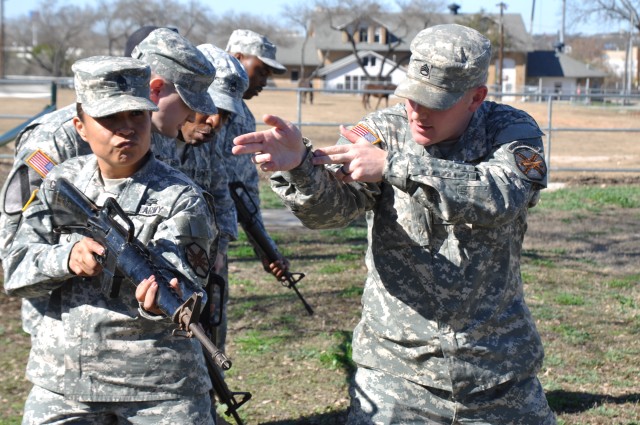FORT SAM HOUSTON, Texas -- "You are all a walking Constitution," said Headquarters and Headquarters Company Sgt. Kevin Rose to his class of about 40 Soldiers during their weekly training.
HHC weekly training begins in the classroom and includes a field component that gives Soldiers a well-rounded perspective on their roles in the Army by stressing the importance of knowing and living the principles that guide the United States government.
The classroom component is an on-going series about history, being an American and all of the different aspects of what Soldiers are doing and why they wear the uniform explained Rose.
"It's vital and something that people need, to realize what they are fighting for and understand what [the Founding Fathers] set out to do when they initially wrote the Constitution," Rose said, adding that Soldiers are direct representatives of American standards and values that make this country the global leader it is today.
Rose explained the key to American ingenuity and the stability of its governing body is adaptability.
"The Constitution is very flexible," Rose said, "meaning that it has been around for over 200 years and that each year that passes involves many changes [in legislation and the legislative process] and those changes still fall under the original Constitution."
Previous classes covered the "Star Spangled Banner," American civil rights and the American Revolution. Future classes will cover the Gettysburg Address and other aspects of American history.
First Sgt. Rosalba Chambers explained that the classroom instruction encourages Soldiers to see the historical context of today's conflicts and understand the implications of their involvement.
Chambers spent time in Iraq.
"Based on what's going on with the global war on terrorism and how the United States is reacting and having to react, and the guidance given by our commander and chief; I feel it's important for Soldiers to be reminded of the reason why we do what we do as we protect our nation," Chambers said.
After the classroom portion, HHC Soldiers spent the rest of the morning executing room-clearing drills.
Chambers said grounding the field exercise training in history makes sense for helping Solders learn and excel at their jobs, especially on the battlefield.
"Maintaining our battle drills - our war fighter skills - is critical in supporting the intent of the United States Constitution. We will continue to fight for our nation and protect our nation."
"This is the basic battle drill rehearsed at every level, whether its normal Soldiers prior to going on mission to [Special Forces] prior to going on mission this is the drill they practice because they know they will have to go into a building," said Sgt. 1st Class Sean Shields.
"It's involved in all operations in Iraq or Afghanistan." Shields deployed to both countries.
Shields explained that doing these types of drills regularly increases the safety and survivability of everybody on the team.
"It increases muscle memory and reactions are automatic," he said.
Sgt. Jonathan Ramierez agreed that constant training builds muscle memory but added that unit cohesion was also factored into the mix. Ramierez spent 15 months in Iraq.
"When you train with everyone on your fire team, you know how they move, you know what they are going to do even before they do it because you know how they're going to react and how they're going to handle the situation. Everybody's on point," Ramierez said.
"You also become interchangeable. Say another platoon takes causalities. You'll be able to pull people from another platoon to plus them up or move to a different squad. It just makes us a well-lubricated machine."
The HHC Soldiers tackled both components of training ardently.
I signed the dotted line to be an infantryman. It's a debt I owe my country. It's something I really like to do," Ramierez said.
"We chose to come into the service," Rose agreed.
There is also a Family component to the training.
"We are a compassionate unit," Chambers said, adding that training will also help Soldiers balance their work life and home life."


Social Sharing